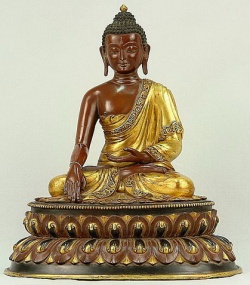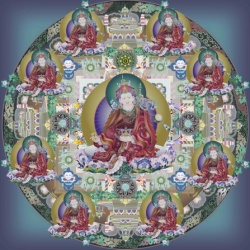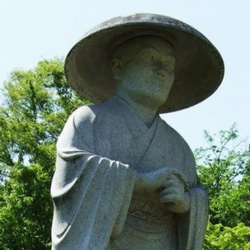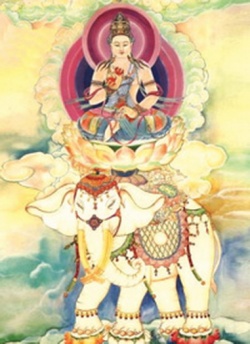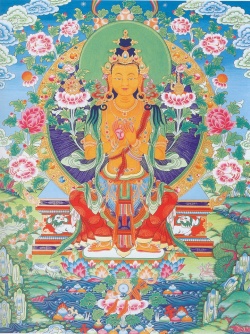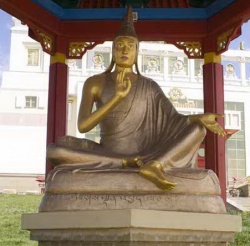The Gospel of Buddha:Chapter 47: The Preacher's Mission
And the Blessed One said to his disciples: [1]
"When I have passed away and can no longer address you
and edify your minds with religious discourse,
select from among you men of good family and education
to preach the truth in my stead.
And let those men be invested with the robes of the Tathagata,
let them enter into the abode of the Tathagata,
and occupy the pulpit of the Tathagata. [2]
"The robe of the Tathagata is sublime forbearance and patience.
The abode of the Tathagata is charity and love of all beings.
The pulpit of the Tathagata is the comprehension of the good law
in its abstract meaning as well as in its particular application. [3]
"The preacher must propound the truth with unshrinking mind.
He must have the power of persuasion rooted in virtue
and in strict fidelity to his vows. [4]
"The preacher must keep in his proper sphere and be steady in his course.
He must not flatter his vanity by seeking the company of the great,
nor must he keep company with persons who are frivolous and immoral.
When in temptation, he should constantly think of the Buddha and he will conquer. [5]
"All who come to hear the doctrine,
the preacher must receive with benevolence,
and his sermon must be without invidiousness. [6]
"The preacher must not be prone to carp at others,
or to blame other preachers; nor speak scandal, nor propagate bitter words.
He must not mention by name other disciples
to vituperate them and reproach their demeanour. [7]
"Clad in a clean robe, dyed with good colour with appropriate undergarments,
he must ascend the pulpit with a mind free from blame and at peace with the whole world. [8]
"He must not take delight in querulous desputations
or engage in controversies so as to show the superiority of his talents,
but be calm and composed. [9]
"No hostile feelings shall reside in his heart,
and he must never abandon the disposition of charity toward all beings.
His sole aim must be that all beings become Buddhas. [10]
"Let the preacher apply himself with zeal to his work,
and the Tathagata will show to him
the body of the holy law in its transcendent glory.
He shall be honoured as one whom the Tathagata has blessed.
The Tathagata blesses the preacher
and also those who reverently listen to him
and joyfully accept the doctrine. [11]
"All those who receive the truth will find perfect enlightenment.
And, verily, such is the power of the doctrine
that even by the reading of a single stanza,
or by reciting, copying, and keeping in mind
a single sentence of the good law,
persons may be converted to the truth
and enter the path of righteousness
which leads to deliverance from evil. [12]
"Creatures that are swayed by impure passions,
when they listen to the voice, will be purified.
The ignorant who are infatuated with the follies of the world will,
when pondering on the profundity of the doctrine, acquire wisdom.
Those who act under the impulse of hatred will,
when taking refuge in the Buddha, be filled with good-will and love. [13]
"A preacher must be full of energy and cheerful hope,
never tiring and never despairing of final success. [14]
"A preacher must be like a man in quest of water
who digs a well in an arid tract of land.
So long as he sees that the sand is dry and white,
he knows that the water is still far off.
But let him not be troubled or give up the task as hopeless.
The work of removing the dry sand must be done
so that he can dig down deeper into the ground.
And often the deeper he has to dig,
the cooler and purer and more refreshing will the water be. [15]
"When after some time of digging
he sees that the sand becomes moist,
he accepts it as a token that the water is near. [16]
"So long as the people do not listen to the words of truth,
the preacher knows that he has to dig deeper into their hearts;
but when they begin to heed his words
he apprehends that they will soon attain enlightenment. [17]
"Into your hands, O ye men of good family and education
who take the vow of preaching the words of the Tathagata,
the Blessed One transfers, intrusts, and commends the good law of truth. [18]
"Receive the good law of truth, keep it, read and re-read it,
fathom it, promulgate it, and preach it to all beings
in all the quarters of the universe. [19]
"The Tathagata is not avaricious, nor narrow-minded,
and he is willing to impart the perfect Buddha-knowledge
unto all who are ready and willing to receive it.
Be ye like unto him.
Imitate him and follow his example
in bounteously giving, showing,
and bestowing the truth. [20]
"Gather round you hearers who love to listen
to the benign and comforting words of the law;
rouse the unbelievers to accept the truth
and fill them with delight and joy.
Quicken them, edify them,
and lift them higher and higher
until they see the truth face to face
in all its splendour and infinite glory." [21]
When the Blessed One had thus spoken, the disciples said: [22]
"O thou who rejoicest in kindness having its source in compassion,
thou great cloud of good qualities and of benevolent mind,
thou quenchest the fire that vexeth living beings,
thou pourest out nectar, the rain of the law! [23]
"We shall do, O Lord,
what the Tathagata commands.
We shall fulfill his behest;
the Lord shall find us obedient to his words." [24]
And this vow of the disciples resounded through the universe,
and like an echo it came back from all the Bodhisattas who are to be
and will come to preach the good law of Truth to future generations. [25]
And the Blessed One said:
"The Tathagata is like unto a powerful king
who rules his kingdom with righteousness,
but being attacked by envious enemies
goes out to wage war against his foes.
When the king sees his soldiers fight
he is delighted with their gallantry
and will bestow upon them donations of all kinds.
Ye are the soldiers of the Tathagata,
while Mara, the Evil One, is the enemy who must be conquered.
And the Tathagata will give to his soldiers the city of Nirvana,
the great capital of the good law.
And when the enemy is overcome, the Dharma-raja,
the great king of truth, will bestow upon all his disciples
the most precious crown which jewel brings perfect enlightenment,
supreme wisdom, and undisturbed peace." [26]
Continue Reading
- The Gospel of Buddha: Preface
- The Gospel of Buddha:Chapter 01: Rejoice
- The Gospel of Buddha:Chapter 02: Samsara and Nirvana
- The Gospel of Buddha:Chapter 03: Truth the Saviour
- The Gospel of Buddha:Chapter 04: The Bodhisatta's Birth
- The Gospel of Buddha:Chapter 05: The Ties of Life
- The Gospel of Buddha:Chapter 06: The Three Woes
- The Gospel of Buddha:Chapter 07: The Bodhisatta's Renunciation
- The Gospel of Buddha:Chapter 08: King Bimbisara
- The Gospel of Buddha:Chapter 09: The Bodhisatta's Search
- The Gospel of Buddha:Chapter 10: Uruvela, the Place of Mortification
- The Gospel of Buddha:Chapter 11: Mara, the Evil One
- The Gospel of Buddha:Chapter 12: Enlightenment
- The Gospel of Buddha:Chapter 13: The First Converts
- The Gospel of Buddha:Chapter 14: Brahma's Request
- The Gospel of Buddha:Chapter 15: Upaka
- The Gospel of Buddha:Chapter 16: The Sermon at Benares
- The Gospel of Buddha:Chapter 17: The Sangha
- The Gospel of Buddha:Chapter 18: Yasa, the Youth of Benares
- The Gospel of Buddha:Chapter 19: Kassapa
- The Gospel of Buddha:Chapter 20: The Sermon at Rajagaha
- The Gospel of Buddha:Chapter 21: The King's Gift
- The Gospel of Buddha:Chapter 22: Sariputta and Moggallana
- The Gospel of Buddha:Chapter 23: Anathapindika
- The Gospel of Buddha:Chapter 24: The Sermon on Charity
- The Gospel of Buddha:Chapter 25: Jetavana
- The Gospel of Buddha:Chapter 26: The Three Characteristics and the Uncreate
- The Gospel of Buddha:Chapter 27: The Buddha's Father
- The Gospel of Buddha:Chapter 28: Yasodhara
- The Gospel of Buddha:Chapter 29: Rahula
- The Gospel of Buddha:Chapter 30: Jivaka, the Physician
- The Gospel of Buddha:Chapter 31: The Buddha's Parents Attain Nirvana
- The Gospel of Buddha:Chapter 32: Women Admitted to the Sangha
- The Gospel of Buddha:Chapter 33: The Bhikkhus' Conduct Toward Women
- The Gospel of Buddha:Chapter 34: Visakha
- The Gospel of Buddha:Chapter 35: The Uposatha and Patimokkha
- The Gospel of Buddha:Chapter 36: The Schism
- The Gospel of Buddha:Chapter 37: The Re-establishment of Concord
- The Gospel of Buddha:Chapter 38: The Bhikkhus Rebuked
- The Gospel of Buddha:Chapter 39: Devadatta
- The Gospel of Buddha:Chapter 40: Name and Form
- The Gospel of Buddha:Chapter 41: The Goal
- The Gospel of Buddha:Chapter 42: Miracles Forbidden
- The Gospel of Buddha:Chapter 43: The Vanity of Worldliness
- The Gospel of Buddha:Chapter 44: Secrecy and Publicity
- The Gospel of Buddha:Chapter 45: The Annihilation of Suffering
- The Gospel of Buddha:Chapter 46: Avoiding the Ten Evils
- The Gospel of Buddha:Chapter 47: The Preacher's Mission
- The Gospel of Buddha:Chapter 48: The Dhammapada
- The Gospel of Buddha:Chapter 49: The Two Brahmans
- The Gospel of Buddha:Chapter 50: Guard the Six Quarters
- The Gospel of Buddha:Chapter 51: Simha's Question Concerning Annihilation
- The Gospel of Buddha:Chapter 52: All Existence is Spiritual
- The Gospel of Buddha:Chapter 53: Identity and Non-Identity
- The Gospel of Buddha:Chapter 54: The Buddha Omnipresent
- The Gospel of Buddha:Chapter 55: One Essence, One Law, One Aim
- The Gospel of Buddha:Chapter 56: The Lesson Given to Rahula
- The Gospel of Buddha:Chapter 57: The Sermon on Abuse
- The Gospel of Buddha:Chapter 58: The Buddha Replies to the Deva
- The Gospel of Buddha:Chapter 59: Words of Instruction
- The Gospel of Buddha:Chapter 60: Amitabha
- The Gospel of Buddha:Chapter 61: The Teacher Unknown
- The Gospel of Buddha:Chapter 62: Parables
- The Gospel of Buddha:Chapter 63: The Widow's Two Mites and the Parable of the Three Merchants
- The Gospel of Buddha:Chapter 64: The Man Born Blind
- The Gospel of Buddha:Chapter 65: The Lost Son
- The Gospel of Buddha:Chapter 66: The Giddy Fish
- The Gospel of Buddha:Chapter 67: The Cruel Crane Outwitted
- The Gospel of Buddha:Chapter 68: Four Kinds of Merit
- The Gospel of Buddha:Chapter 69: The Light of the World
- The Gospel of Buddha:Chapter 70: Luxurious Living
- The Gospel of Buddha:Chapter 71: The Communication of Bliss
- The Gospel of Buddha:Chapter 72: The Listless Fool
- The Gospel of Buddha:Chapter 73: Rescue in the Desert
- The Gospel of Buddha:Chapter 74: The Sower
- The Gospel of Buddha:Chapter 75: The Outcast
- The Gospel of Buddha:Chapter 76: The Woman at the Well
- The Gospel of Buddha:Chapter 77: The Peacemaker
- The Gospel of Buddha:Chapter 78: The Hungry Dog
- The Gospel of Buddha:Chapter 79: The Despot
- The Gospel of Buddha:Chapter 80: Vasavadatta
- The Gospel of Buddha:Chapter 81: The Marriage-Feast in Jambunada
- The Gospel of Buddha:Chapter 82: A Party in Search of a Thief
- The Gospel of Buddha:Chapter 83: In the Realm of Yamaraja
- The Gospel of Buddha:Chapter 84: The Mustard Seed
- The Gospel of Buddha:Chapter 85: Following the Master Over the Stream
- The Gospel of Buddha:Chapter 86: The Sick Bhikkhu
- The Gospel of Buddha:Chapter 87: The Patient Elephant
- The Gospel of Buddha:Chapter 88: The Conditions of Welfare
- The Gospel of Buddha:Chapter 89: Sariputta's Faith
- The Gospel of Buddha:Chapter 90: Pataliputta
- The Gospel of Buddha:Chapter 91: The Mirror of Truth
- The Gospel of Buddha:Chapter 92: Ambapali
- The Gospel of Buddha:Chapter 93: The Buddha's Farewell Address
- The Gospel of Buddha:Chapter 94: The Buddha Announces His Death
- The Gospel of Buddha:Chapter 95: Chunda, the Smith
- The Gospel of Buddha:Chapter 96: Metteyya
- The Gospel of Buddha:Chapter 97: The Buddha's Final Entering into Nirvana
- The Gospel of Buddha:Chapter 98: The Three Personalities of the Buddha
- The Gospel of Buddha:Chapter 99: The Purpose of Being
- The Gospel of Buddha:Chapter 100: The Praise of All the Buddhas
